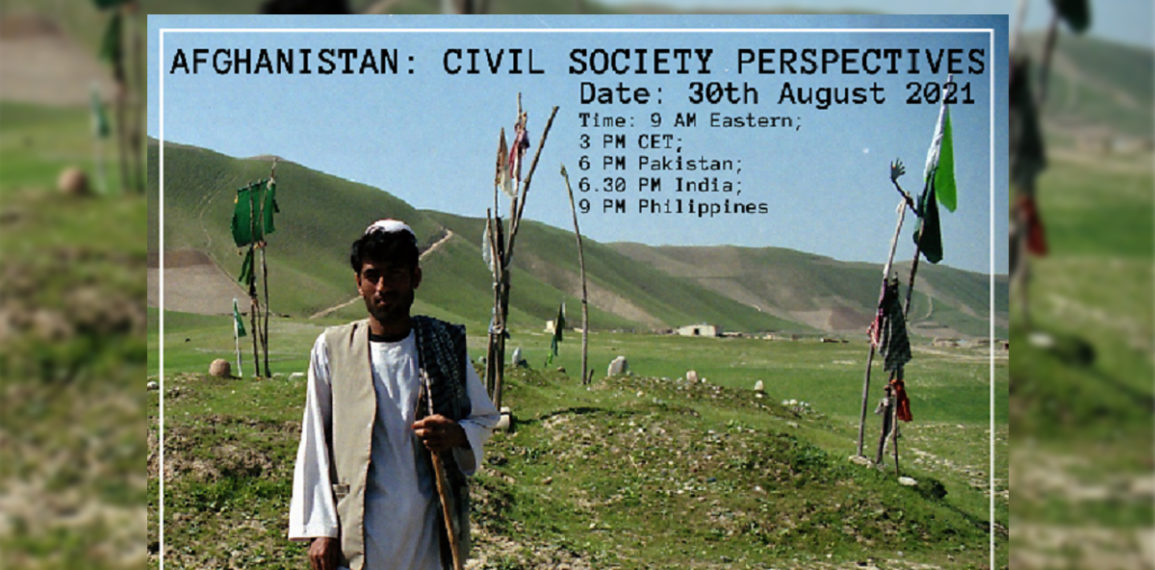Webinar - Afghanistan: Civil Society Perspectives
AEPF and TNI organised a Webinar with a number of international experts to discuss a civil society approach to the crisis in Afghanistan.
Civil society internationally needs to extend solidarity with the Afghan people who have been betrayed by military interventions by the US and other powers. The takeover by the Taliban and imposition of religious extremisms further oppresses Afghan women and society. Experts talk of the various developments in Afghanistan in this webinar.
Watch the Webinar:
Webinar Summary:
Focus on Afghanistan: Civil Society Perspectives. – A Brief Report by Kris Vanslambrouk
Afghanistan has been in international spotlight in recent weeks. Many experts, witnesses and journalists were able to share their analyses. However, the views of civil society activists barely got space in the media. The Asia Europe People’s Forum and the Transnational Institute (TNI) filled this gap with a webinar on August 30th. A number of strong statements and recommendations were formulated under the skilful moderation of Gie Goris, who has long standing expertise on Afghanistan and far beyond.
Sahar Saba of RAWA (Revolutionary Association of Women of Afghanistan) called not to abandon the Afghan people in the first place and pressed the international community to make more efforts to protect human rights activists: “There is more protest against the Taliban then expected, especially by women. It remains to be seen how strongly this will resonate and whether the Taliban will take a more moderate stance.”
Afrasaiab Khattak (former chairman of the Pakistan Human Rights Commission) emphasises that ‘Afghanistan has been highly urbanised over the past 20 years and new universities and institutions established. The Taliban will have to adjust, the population has changed. Pakistan’s positions will play an important role, many civil society organisations are involved in solidarity actions with Afghan activists, such as providing a safe shelter in our country.’
Achin Vanaik (writer, activist and retired professor at Delhi University) is a strong advocate of open borders and against international isolation. “We must assist the population with food aid and medical assistance, but at the same time we must be open to a debate about conditional cooperation with the Taliban, and maintain a certain military pressure. However, a new intervention is out of the question.”
Anuradha Chenoy (Professor -retired, School of International Studies at Jawaharlal Nehru University) reminds us that civil society organisations had predicted the current scenario: “We have always strongly condemned military intervention.” She also questioned the hypocrisy of the international community and their demand to install an “inclusive government”: “As if Russia, China, India and even the US have inclusive governments.”
Khury Petersen-Smith (Institute of Policy Studies, Washington) emphasises that the refugee crisis, once again, presses the international community to face the facts: “It is high time to rethink the concept and status of refugees. Imagine what can be done with the billions of dollars left unspent by the US withdrawal. There must be creative ways to support Afghan civil society by working with the diaspora and progressive forces within the country itself. It’s our duty to give people in danger a safe place, the US has done so much damage in this country, we have to make up for this somehow
Speakers:
1. Khury Petersen-Smith is a Fellow of Institute for Policy Studies, Washington and researches U.S. empire, borders, and migration.
2. Achin Vanaik Fellow at TNI, is a writer, social activist and retired Professor, University of Delhi.
3. Sahar Saba, Afghan women’s rights activist and former spokesperson for Revolutionary Afghan Women’s Association.
4. Afrasaiab Khattak, former Senator and former Chairperson Pakistan Human Rights Commission.
5. Anuradha Chenoy Former Dean and Retired Professor, School of International Studies, Jawaharlal Nehru University.
Moderators: Gie Goris- Belgian Journalist, author, who has covered Afghanistan for more than two decades.
Organized by: Asia Europe Peoples Forum (AEPF) & Transnational Institute (TNI)




